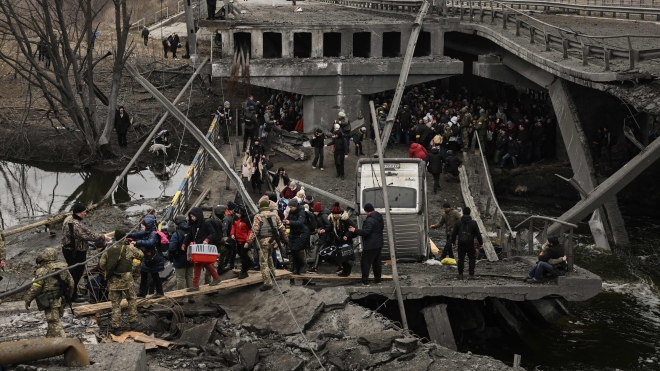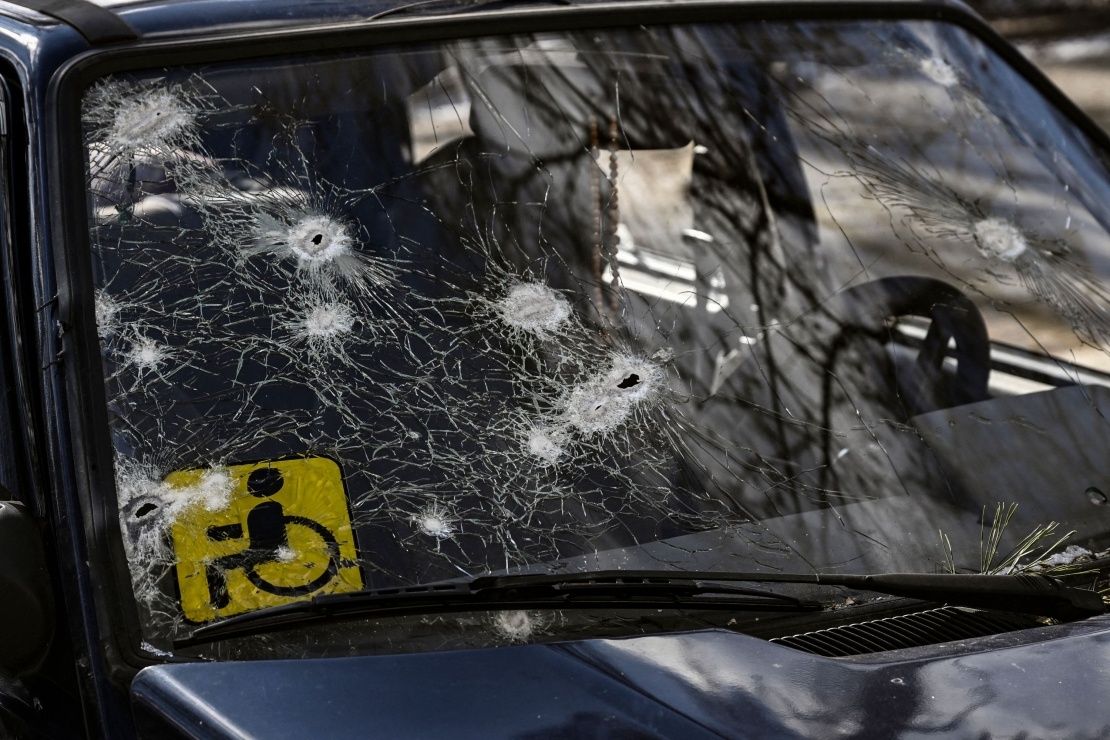Andriy Piven, Kyiv, 37 years old, before the war ― a fitness instructor
On the morning of February 24, I had heard some explosion, but I was assuring myself that it just seemed to me. Only the noise of the worried neighbors above my flat made me get up and come to the window. After that, I understood that it was all real. I woke up my wife quietly and said that the war had begun. To our daughter I said that the adventures we had been preparing for are now started, so we packed up and started our journey.
In 3-4 days, after making sure that they crossed the border with Slovakia, I returned home. Kyiv was bombed and shelled at that time. My friends and I wanted to take up arms, but the Territorial Defense units of the city were full, and we started to think about what else we could do to help. So we returned to volunteering: weʼve been engaged in this since 2014.
The first trip was on March 3 to Irpin city (Kyiv suburb): we brought food and fuel there and helped some locals move out on the way back. It was all under fire, but it did not fire in our direction. We unloaded, brought medicine to the military hospitals (the doctors were very happy about it), and then left.
A civilian car fired by Russians in Irpin on March 10, 2022.
On March 5, we managed to get [to Irpin], got locals into the car, but then the battle started, and we couldnʼt leave the city. We had to hide in the basement of the church. There were airstrikes and mortar shelling, and we found ourselves surrounded. There were people on the streets who looked like Chechens. We thought we would stay there for the night and started removing everything compromising from our smartphones.
Three hours later, thanks to our friends, the Ukrainian Marines learned that there were volunteers under fire. Between the battles, they came to us, and at very high speeds, we left Irpin. The glass in the car was broken, one of our volunteers had his leg wounded, others had minor injuries.
We left six cars in the occupiers-controlled part of the city. The next day we returned there, got into the cars that were still working, and went to the peopleʼs houses to evacuate the locals. We returned to that church as there were about two hundred people, many of them are children.
As of now, we drive to specific addresses and try to take out as many people as possible. The thing that bothers me the most is that we canʼt help those people who are now under Russian occupation. Their relatives ask us to take them away, but unfortunately, none of us has many lives. We canʼt go there and help.
Anti-tank hedgehogs on one of the streets of Irpin, March 10, 2022.
Getty Images / «Babel'»
Pavlo Fedosenko, Kharkiv, 30, before the war ― journalist and entrepreneur
Like many people in Kharkiv, I had a strange feeling on the eve. Iʼve been staying awake until 3 am, thinking about what to do tomorrow to prepare myself and my family [for possible war] as much as possible. I drank whiskey in the kitchen and went to bed at about 4 am. I woke up at half-past seven with the help of an alarm clock, saw 18 missed calls on the phone, opened the chat of local journalists. The first message for today was written at 05:26, and the questions were all the same: “What is that explodes? What is happening? I went to the bedroom, woke up my wife, said that the war had begun and we had to leave.
Like all serious and responsible people, we did not prepare our emergency backpacks. We started collecting it along the way, pretty quickly. In the city, it seemed, most people still did not believe what was happening. They formed awful queues near ATMs. I immediately decided that I needed to take my family out of the country.
I took them to the border with Moldova, they crossed it on foot, and I returned. There was not even a slightest doubt that I had to come back. Although my mother and wife persuaded me against it, and all the people I met along the way said, “Are you mad? Come on, youʼll be more effective in some other place." And I said, "No, I canʼt do that."
Kharkiv after the Russian shelling and air strikes, March 12, 2022.
Stas Kozlyuk / «Babel'»
My initial plan was to join the Territorial Defense. But it turned out that there are so many guys like me — inexperienced men with fiery eyes — that there are no weapons for all of us. So I started evacuating people — this story found me itself. I just happened to be in the right place at the right time. It was hard: dozens, hundreds of people called me every way with a request to take them out. I was on the phone for five days non-stop. I woke up at seven in the morning — and there already were 10-15 missed calls from people who wanted to leave. One day we planned to evacuate 50 people. As a result, we evacuated 75 ― the buses were jammed with standing people, there was absolute madness. Now, unfortunately, or fortunately, the demand has decreased, and there is almost no one to take out. Yesterday, [on March 12,] our bus wasnʼt packed for the first time [since we began evacuating people].
Russians are shelling Kharkiv constantly. It became a usual thing. We have an air alarm just right now.
Kharkiv after the Russian shelling and air strikes, March 12, 2022.
Stas Kozlyuk / «Babel'»
One day we were rescuing an older woman. The request was this: “Will you help move out my grandmother? She doesnʼt walk, and she lives on the 10th floor." And this is the outskirts of the city, which were then heavily shelled. I replied: "Of course, itʼs easy!". We went to this old woman. When we entered the apartment, I was no longer sure it would work out. The woman was very old, and she couldnʼt walk at all. Her daughter didnʼt help. On the contrary, she panicked and repeated that she has three more cats and chinchillas, which also had to be rescued. We were carrying this older woman from the 10th floor and the wheelchair by the stairs. I still have bruises on my legs, as they were kicked by the wheelchair with my every step.
When we were already loading this woman in the car, a shell fell somewhere in the next yard – it had never fallen this close to me. Me and Dima, another volunteer, looked at each other, and we just started throwing everything into the car. But we still had a wheelchair. It did not fit into the trunk of our car, nor in the back seat. Iʼm not sure this is physically possible in a normal situation, but Dima sat with that wheelchair in the front seat. It was the hardest day.
Although now there is no such rush as at the beginning, there is still something we need to do. Now we will bring humanitarian aid from Poltava city. I will continue helping because I have a car and money. Right now, Iʼm going to help one woman get on a bus. Her daughter wrote me yesterday, explaining that two weeks ago this woman saw how that car exploded, and for two weeks she couldnʼt persuade herself to leave the house. But now, she has decided to evacuate. I am asked to pick her up, hold her hand, calm her down, and take her to the bus. There are still many cases when people need help, I can bring food or medicine somewhere. And I will continue doing this until I join [the military] forces.
Our publication relies on readersʼ donations. Please support Babel now !
Kharkiv after the Russian shelling and air strikes, March 12, 2022.
Stas Kozlyuk / «Babel'»


